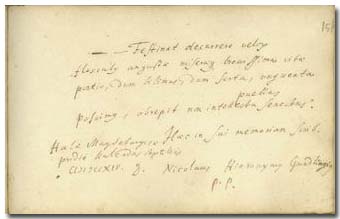
— — Festinat decurrere velox
flosculus angustae miseraeque breuissima vitae
portio, dum bibimus, dum serta, unguenta, puellas
poscimus, obrepit non intellecta senectus. *
Haec in sui memoriam scrib[ebat]
Nicolaus Hieronymus Gundlingius P[rofessor] P[hilosophiae]
Halae Magdeburgicae,

|
* Juvenal, Saturae 9.126-129.
|
|
|
Hastily fades the transient / flower, our part from the tight and
miserable life is short, / and while we drink, and desire girls
and wreaths, / old age catches us unawares. *
Written for his own memory
Nicolaus Hieronymus Gundling, professor of philosophy
In Halle of Magdeburg, on the day before the
calends of September 1714.
|
p.
151. Halle, August 31, 1714
Gundling, Nicolaus Hieronymus
(1671-1729), German jurist
Nicolaus
Hieronymus Gundling was born on February 25, 1671 in the village
of Kirchsittenbach near to Nürnberg, a son of the pastor Wolfgang Gundling (?-1689),
brother of the unfortunate Baron Jacob Paul von Gundling. He
learned with his father and in Nürnberg, and from 1690 he read
theology in Altdorf, Jena and Leipzig. In 1695 he defended the
treatise of his father in Altdorf, obtained licenciate, and went
to preach in Nürnberg. From 1699 he was a tutor to noble sons in
Halle, and here he began to read law under the influence of the
renowned Christian Thomasius
(1655-1728). In 1703 he obtained a degree in law, and then he
taught law, history, philosophy and rhetorics in Halle. From 1705
on he was promoted almost every year: he became extraordinary and
then ordinary professor of philosophy, of eloquence, of
international and natural law, and finally Secret Councillor of
the Prussian King. He was an open-minded personality and a good
preacher, a popular member in university circles. His good humor
was not poisoned neither by his ruined matrimony and by gossips
spreading about him. He was a passionate book collector. He
published a lot, although did not write anything outstanding. He
died in Halle, being rector of the university, on December 9,
1729. Some of his more remarkable works:
Disputatio inauguralis juridica de transactione, testamenti
tabulis non inspectis. Halle, 1703. – Otia. Frankfurt,
Leipzig, Halle, 1706-1707. 3 Bde. – Observationes selectae.
Halle, 1707-1710. 1-3 Bde. – Gundlingiana, darinnen allerhand
zur Jurisprudentz, Philosophie, Historie, Critic, Litteratur
… Halle, 1715-1732. 45 Stück. – Digesta, in quibus rationis
principia ius Romanum et Teutonicum … expenduntur … Halle,
1723.
Some twenty persons writing in the album dated
their contributions according to the ancient Roman calendar, counting
the days back from the fifth or seventh day of the month (Nonae,
the ninth day before Idus), from the thirteenth or fifteenth day
(Idus), or from the first day of the following month (Calendae),
respectively. The year in Rome began on the first of March. –
Gundling uses the other Roman name for September: Septilis, the
seventh month. Thus the meaning of the date "pridie Kalendas
Septileis" is: the day before the first day of September, that is,
August 31. August is also called with the old Roman name
"Sextilis" in another note, written by Samuel Scheurer (241. p.).
• ADB •
Jöcher • Michaud • Pallas |

